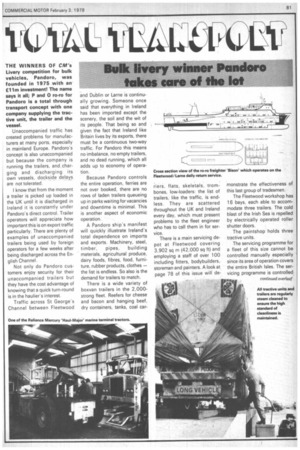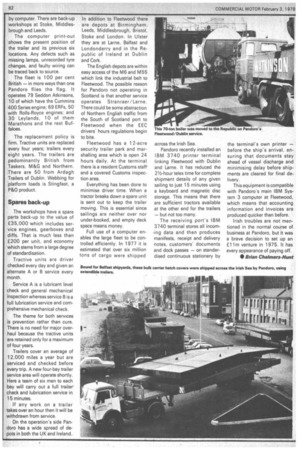Bulk livery winner Pandoro takes care of the lot
Page 83

Page 84

If you've noticed an error in this article please click here to report it so we can fix it.
THE WINNERS OF CM's Livery competition for bulk vehicles, Pandoro, was founded in 1975 with an £11m investment! The name says it all; P and 0 ro-ro for Pandoro is a total through transport concept with one company supplying the tractive unit, the trailer and the vessel.
Unaccompanied traffic has created problems for manufacturers at many ports, especially in mainland Europe. Pandoro's concept is also unaccompanied but because the company is running the trailers, and charging and discharging its own vessels, dockside delays are not tolerated.
I know that from the moment a trailer is picked up loaded in the UK until it is discharged in Ireland it is constantly under Pandoro's direct control. Trailer operators will appreciate how important this is on export traffic particularly. There are plenty of examples of unaccompanied trailers being used by foreign operators for a few weeks after being discharged across the English Channel.
Not only do Pandoro customers enjoy security for their unaccompanied trailers but they have the cost advantage of knowing that a quick turn-round is in the haulier's interest.
Traffic across St George's Channel between Fleetwood and Dublin or Larne is continually growing. Someone once said that everything in Ireland has been imported except the scenery, the soil and the wit of its people. That being so and given the fact that Ireland like Britain lives by its exports, there must be a continuous two-way traffic. For Pandoro this means no imbalance, no empty trailers, and no dead running, which all adds up to economy of operation.
Because Pandoro controls the entire operation, ferries are not over booked, there are no rows of laden trailers queueing up in parks waiting for vacancies and downtime is minimal. This is another aspect of economic operation.
A Pandoro ship's manifest will quickly illustrate Ireland's total dependence on imports and exports. Machinery, steel, timber, pipes, building materials, agricultural produce, dairy foods, fibres, food, furniture, rubber products, clothes — the list is endless. So also is the demand for trailers to match.
There is a wide variety of boxvan trailers in the 2,000strong fleet. Reefers for cheese and bacon and hanging beef, dry containers, tanks, coal car
riers, flats, skeletals, trombones, low-loaders: the list of trailers, like the traffic, is endless. They are scattered throughout the UK and Ireland every day, which must present problems to the fleet engineer who has to call them in for service.
There is a main servicing depot at Fleetwood covering 3,902 sq m (42,000 sq ft) and employing a staff of over 100 including fitters, bodybuilders, storeman and painters. A look at page 78 of this issue will de
monstrate the effectiveness of this last group of tradesmen.
The Fleetwood workshop has 16 bays, each able to accommodate three trailers. The cold blast of the Irish Sea is repelled by electrically operated roller shutter doors.
The paintshop holds three tractive units.
The servicing programme for a fleet of this size cannot be controlled manually especially since its area of operation covers the entire British Isles. The servicing programme is controlled by computer. There are back-up workshops at Stoke, Middlesbrough and Leeds.
The computer print-out .shows the present position of the trailer and its previous six locations. Any defects such as missing lamps, unrecorded tyre changes, and faulty wiring can be traced back to source.
The fleet is 100 per cent British — in more ways than one Pandoro flies the flag. It operates 79 Seddon Atkinsons, 10 of which have the Cummins 400 Series engine; 69 ERFs, 50' with Rolls-Royce engines; and 30 Leylands, 10 of them Marathons and the rest Buffaloes.
The replacement policy is firm. Tractive units are replaced every four years; trailers every eight years. The trailers are pedorninantly British from Taskers, M&G and Northern. There are 50 from Ardagh Trailers of Dublin. Webbing for .platform loads is Stingfast, a P&O product.
Spares back-up
The workshops have a spare parts back-up to the value of £35,000 which includes service engines, gearboxes and diffs. That is much less than £200 per unit, and economy which stems from a large degree of standardisation.
Tractive units are driver checked every day and given an alternate A or B service every month.
Service A is a lubricant level check and general mechanical inspection whereas service B is a full lubrication service and comprehensive mechanical check.
The theme for both services is prevention rather than cure. There is no need for major overhaul because the tractive units are retained only for a maximum of four years.
Trailers cover an average of 12,000 miles a year but are serviced and checked before every trip. A new four-bay trailer service area will operate shortly. Here a team of six men to each bay will carry out a full trailer' check and lubrication service in 15 minutes.
If any work on a trailer takes over an hour then it will be withdrawn from service.
On the operation's side Pandora has a wide spread of depots in both the UK and Ireland. In addition to Fleetwood there are depots at Birmingham, Leeds, Middlesbrough, Bristol, Stoke and London. In Ulster they are at Larne, Belfast and Londonderry and in the Republic of Ireland at Dublin and Cork.
The English depots are within easy access of the M6 and M55 which link the industrial belt to Fleetwood. The possible reason for Pandoro not operating in Scotland is that another service operates Stranraer/ Larne.
There could be some abstraction of Northern English traffic from the South of Scotland port to Fleetwood when the EEC drivers' hours regulations begin to bite.
Fleetwood has a 12-acre security trailer park and mar shalling area which is open 24 hours daily. At the terminal there is a resident Customs staff and a covered Customs inspection area.
Everything has been done to minimise driver time. When a tractor breaks down a spare unit is sent out to keep the trailer moving. This is essential since sai1ings are neither over nor under-booked, and empty deck space means money.
Full use of a computer enables the large fleet to be controlled efficiently. In 1977 it is estimated that over six million tons of cargo were shipped across the Irish Sea.
Pandoro recently installed an IBM 3740 printer terminal linking Fleetwood with Dublin and Larne. It has reduced the 21/2-hour telex time for complete shipment details of any given sailing to just 15 minutes using a keyboard and magnetic disc storage. This means that there are sufficient tractors available at the other end for the trailers — but not too many.
The receiving port's IBM
3740 terminal stores all incoming data and then produces
manifests, receipt and delivery notes, customers' documents and dock passes — on standardised continuous stationery by the terminal's own printer — before the ship's arrival, ensuring that documents stay ahead of vessel discharge and minimising delay before shipments are cleared for final delivery.
This equipment is compatible with Pandoro's main IBM System 3 computer at Fleetwood, which means that accounting information and invoices are produced quicker than before.
Irish troubles are not mentioned in the normal course of business at Pandoro, but it was a brave decision to set up an £11m venture in 1975. It has every appearance of paying off..
• Brian Chalmers-Hunt
























































































































































